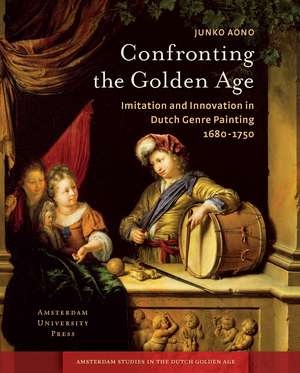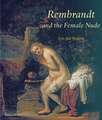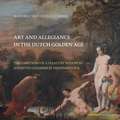Confronting the Golden Age: Imitation and Innovation in Dutch Genre Painting 1680-1750: Amsterdam Studies in the Dutch Golden Age
Autor Junko Aonoen Limba Engleză Hardback – 8 mar 2015
Dutch genre paintings of the period between 1680 and 1750 have historically been cast as uninspired repetitions of art from the mid-seventeenth-century Dutch Golden Age. In Confronting the Golden Age, Junko Aono reconsiders these oft-dismissed paintings, repositioning them as dynamic works that played an instrumental role in the canonization of the art of the Golden Age.
Drawing on archival documents, sales catalogs, and other texts, Aono closely analyzes a range of genre paintings—many of them handsomely reproduced in this volume. In the process, she deepens our understanding of these works and reveals how they illuminate the relationships among painters, collectors, and the dominant artistic currents of the time.
Drawing on archival documents, sales catalogs, and other texts, Aono closely analyzes a range of genre paintings—many of them handsomely reproduced in this volume. In the process, she deepens our understanding of these works and reveals how they illuminate the relationships among painters, collectors, and the dominant artistic currents of the time.
Preț: 647.79 lei
Preț vechi: 1017.85 lei
-36% Nou
Puncte Express: 972
Preț estimativ în valută:
123.95€ • 129.42$ • 102.59£
123.95€ • 129.42$ • 102.59£
Carte indisponibilă temporar
Doresc să fiu notificat când acest titlu va fi disponibil:
Se trimite...
Preluare comenzi: 021 569.72.76
Specificații
ISBN-13: 9789089645685
ISBN-10: 9089645683
Pagini: 272
Ilustrații: 129 color plates
Dimensiuni: 178 x 248 x 20 mm
Greutate: 0.98 kg
Ediția:New.
Editura: Amsterdam University Press
Colecția Amsterdam University Press
Seria Amsterdam Studies in the Dutch Golden Age
ISBN-10: 9089645683
Pagini: 272
Ilustrații: 129 color plates
Dimensiuni: 178 x 248 x 20 mm
Greutate: 0.98 kg
Ediția:New.
Editura: Amsterdam University Press
Colecția Amsterdam University Press
Seria Amsterdam Studies in the Dutch Golden Age
Notă biografică
Junko Aono is associate professor of art history at Kyushu University, Fukuoka in Japan.
Cuprins
CHAPTER I
Confronting the Heritage of the Golden Age: the Situation around Dutch Genre Painting 1680-1750
Introduction
1 Painter and collector in transition: the search for a new relationship
2 The collector ’s taste: in praise of seventeenth-century Dutch genre painting
3 Popular subject matter of genre painting in eighteenth-century collections
4 The painter ’s choice: updating seventeenth-century genre painting
CHAPTER II
Reproducing the Golden Age: Copies after Seventeenth-Century
Dutch Genre Painting in the First Half of the Eighteenth Century
1 Commercial misuse of copies: discussion between Johan van Gool and Gerard Hoet
2 Copies as substitutes for seventeenth-century painting
3 The painter ’s choice: in search of a favorite painte and subject matter
4 Case study: the candlelight scene as popular subject
5 The function of copying: looking back to the Golden Age
CHAPTER III
Emulating the Golden Age: The Painter’s Choice of Motifs and Subject Matter in Dutch Genre Painting of the First Half of the Eighteenth Century
1 The painter ’s choice of subject matter
1.1. Willem van Mieris and his genre painting
1.2. Johan Hendrik van Wassenaer Obdam: a devotee of genre painting
1.3. The case study of A Grocer’s Shop by Willem van Mieris
2 Competing with the “old masters”: pendants by Gerard Dou, Willem van Mieris and Hieronymus van der Mij
3 “Pleasurable enjoyment of dissimilar similarity”
CHAPTER IV
Ennobling Daily Life: A Question of Refinement in Early
Eighteenth-Century Dutch Genre Painting
1 Gerard de Lairesse’s attempt to ennoble genre painting
2 The painter ’s practice of idealizing figures in genre painting
3 To meet new demands of collectors: seeking ideal versatility
Confronting the Heritage of the Golden Age: the Situation around Dutch Genre Painting 1680-1750
Introduction
1 Painter and collector in transition: the search for a new relationship
2 The collector ’s taste: in praise of seventeenth-century Dutch genre painting
3 Popular subject matter of genre painting in eighteenth-century collections
4 The painter ’s choice: updating seventeenth-century genre painting
CHAPTER II
Reproducing the Golden Age: Copies after Seventeenth-Century
Dutch Genre Painting in the First Half of the Eighteenth Century
1 Commercial misuse of copies: discussion between Johan van Gool and Gerard Hoet
2 Copies as substitutes for seventeenth-century painting
3 The painter ’s choice: in search of a favorite painte and subject matter
4 Case study: the candlelight scene as popular subject
5 The function of copying: looking back to the Golden Age
CHAPTER III
Emulating the Golden Age: The Painter’s Choice of Motifs and Subject Matter in Dutch Genre Painting of the First Half of the Eighteenth Century
1 The painter ’s choice of subject matter
1.1. Willem van Mieris and his genre painting
1.2. Johan Hendrik van Wassenaer Obdam: a devotee of genre painting
1.3. The case study of A Grocer’s Shop by Willem van Mieris
2 Competing with the “old masters”: pendants by Gerard Dou, Willem van Mieris and Hieronymus van der Mij
3 “Pleasurable enjoyment of dissimilar similarity”
CHAPTER IV
Ennobling Daily Life: A Question of Refinement in Early
Eighteenth-Century Dutch Genre Painting
1 Gerard de Lairesse’s attempt to ennoble genre painting
2 The painter ’s practice of idealizing figures in genre painting
3 To meet new demands of collectors: seeking ideal versatility
Recenzii
“Groundbreaking. . . . This beautifully produced volume fills a gap in Dutch visual and cultural studies. Highly recommended.”
“Confronting the Golden Age offers not only analysis of a body of work that has heretofore received limited attention, but also an examination of the artists’ response to a recent past that was already lauded by collectors as the Golden Age. The catalogue of painters, many of whom may be unfamiliar to non-specialists, is a welcome resource.”











